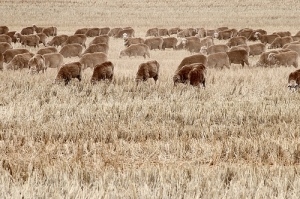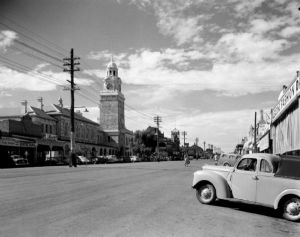We flew from Nairobi to Aden, during which time I managed to cover the baby , Robert (who was about nine months old at this time), in gin and pork stew due to a mite of turbulence on the way. However, he’s always been a resilient child and he didn’t seem to mind too much (the same cannot be said for Margaret).
Robert, in contrast to James and Kathy, was very blonde and possessed remarkably blue eyes. This held him in good stead when we boarded the ship as our fellow passengers included a large community of Greek matriarchs who instantly took to him with cries of delight and wonder.
At least once a day on the six-week journey a frantic search for the baby would usually reveal him being joyfully kissed and tickled and fed vast quantities of hummus. This was a great relief to me as it was I in charge of entertaining the children each day while Margaret washed a mountain of nappies, ironed clothes and prepared meals.
We disembarked at Perth and, after parking Margaret and the children with my sister Jean, I went looking for work. It was much easier to find then I had nervously anticipated. I walked into an Elders shop, who were (and still are) well known stock and land agents all over Australia, and walked out with a job rounding up sheep for the sales.
It wasn’t highly paid work but it was employment and it was a start.
My work colleagues were real Aussies and as soon as they knew I was English (being none too savvy about the geography of the rest of the world) they began taking the piss out of me as a “pommy bastard”.
Deciding that knocking their blocks off in my first week was not a judicious plan I instead adopted my most English accent and herded the sheep with a high pitched and gentle “come along now, you jolly jumbucks”.
Disgusted at such unmanly language and behaviour they decided I was a lost cause (or possibly a bit mad) and they left me well alone. But now, of course, I had to keep up the pretence. I managed it for a few weeks but one particularly irritating sheep smashed my carefully cultivated act as I let fly with a stream of abuse that mixed Swahili with some choice English phrases that I think shocked even my new work-mates. However, so relieved were they that I was then welcomed with open arms and invites to the pub.
It was only a few months later that I was transferred a bit further north-west of Perth to a place called Merredin. This time I was herding both sheep and cattle that were coming down from the North to the saleyards. Some of the cattle were almost wild and had probably only been mustered once or twice in their life, which certainly added a spice of danger to the job each day.
There were three of us in Merredin and we were also expected to negotiate with the local farmers and convince them to sell their sheep through us. The farms out there were mostly wheat but the farmers would usually also keep a few hundred head of sheep, despite having very little idea about what to do with them. As a little side business we would offer to muster, dip, mark and inoculate the herd for them before they were sent to market. The farmer, rather than Elders would pay us but what I did not learn, until a bit later, was that payment was usually in the form of a large, fat sheep.
This was only brought home to me the afternoon after I had helped to inoculate a huge herd of sheep and the farmer, hat drawn low over the face, nodded his thanks and jerked his thumb towards a sheep telling me it was mine.
“I beg your pardon?” I responded. He looked at me for some moments and then repeated the phrase more slowly, as if for a small child or an idiot.
“Er…that’s very kind of you but I don’t have anything to transport it in,” I said motioning to my small, sedan car.
The farmer shrugged. “That’s your payment. Take it or leave it.”
I looked at this fat sheep and she looked at me with a wild eye. But it had been a long day so I was determined to at least make the attempt to take payment. I asked one of the farmhands to help me tackle the sheep and we managed to wrestle it to the ground about 40 minutes later, tying its legs together with some rope. Then we carried it kicking and struggling like the devil herself, to the car where I buckled it into the seat belt on the passenger side.
I had some qualms regarding the interior but to my surprise, once she was strapped in the sheep stopped struggling and sat there incredibly calmly. In fact, as we headed back into the town, I would have sworn she positively enjoying the ride. She made not the smallest movement and looked out the window for most of the journey, serenely taking in the scenery. The same could not be said for all the passers-by who saw her as we drove through the town. I’ve never seen so many dropped jaws and double-takes in my life. In terms of entertainment value that sheep was worth its weight in gold.
I was soon moved again but this time the posting was to Kalgoorlie, a mining town on the edge of the desert. It consisted of one main street with a couple of big public buildings and the rest were pubs and whore-houses. It was wild and remote and Margaret had just given birth to our fourth child, another son called Donald. She was not keen on making the move and I was not keen for her and the children to be in such a town. So I left them in Merredin while I determined to try and get a transfer as soon as possible.
My job was to meet the sheep and cattle trucks coming from South Australia to Western Australia (WA) on the rail line that crossed the desolate Nullarbor Plain. Each Australian state had their own gauge rail lines and its own quarantine rules so the sheep had to be unloaded at the border, checked and shorn, and then reloaded before they could continue the journey. One of my jobs was to take the dead sheep off the rail-trucks and dispose of them. It was pretty dirty work to say the least. As the result of a former drought in WA, large numbers of sheep were being bought from South Australia and the temptation for farmers to over-crowd the carriages was too great to resist. This meant we usually had about 40 or 50 carcasses on each train. We would load them onto my truck and I would drive them to an old mine shaft on the other side of town where we disposed of the bodies.
On the day of the annual Kalgoorlie race meeting there was always a town parade. In blissful ignorance of this I loaded up my truck with the day’s load of dead sheep and headed into town. The police, in blissful ignorance of my cargo, decided I would be the last vehicle to go through town before they closed the road. By the time I realised what was going on I had to keep going (as I said there was only one real road in Kalgoolie) while behind me the parade started up. The band started playing, people lined the streets laughing and clapping and waving flags at me, evidently under the impression my truck was part of the parade. Then the stench of the dead sheep would hit them. The change in expression was so ludicrous that I could barely drive because I was laughing so much.
I finished covering myself in glory by going to the ball held that night. The general manager of Elders in Western Australia was attending and so was his pretty wife who was at least 30 years younger than he was. I spent the night dancing and flirting with her and a week later she invited me as her “special guest” to a picnic.
I got my long-awaited transfer back to civilisation two days later. But this time I was moving states- to Queensland.

